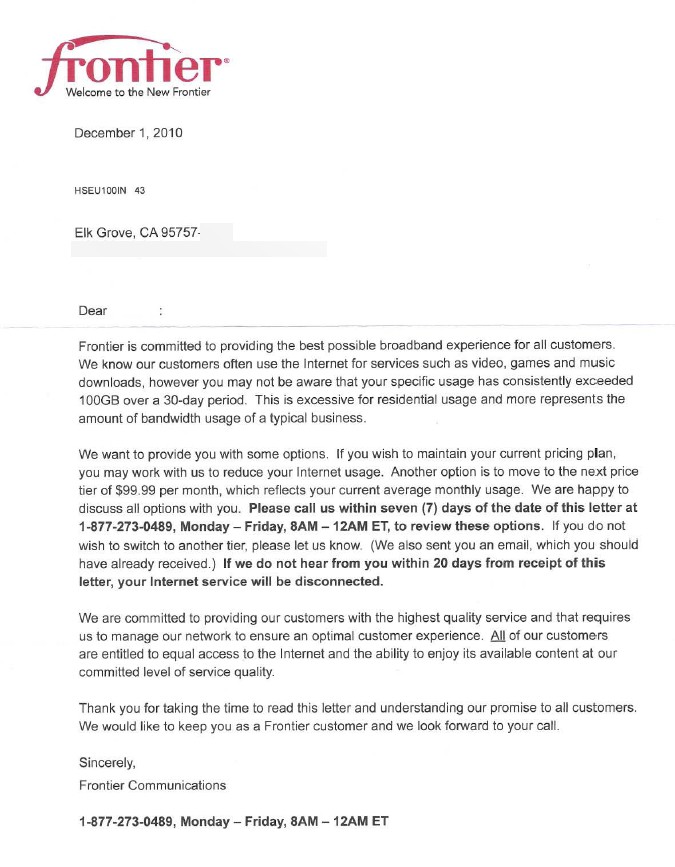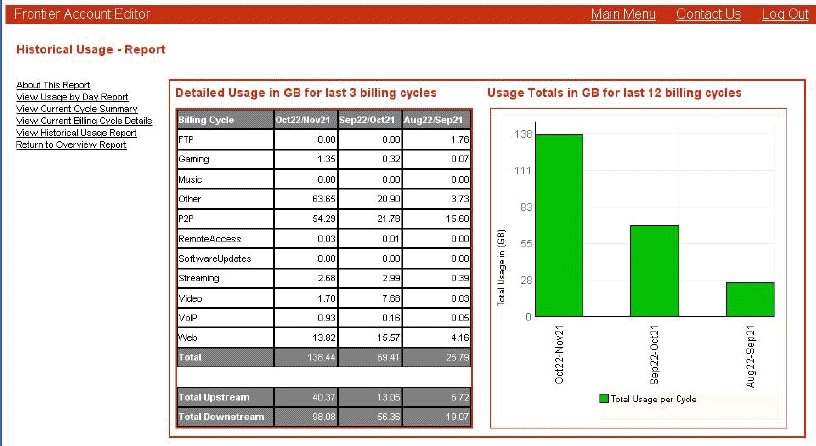
 Frontier Communications is trying to enforce an Internet Overcharging scheme it deleted from its Acceptable Use Policy months earlier, telling customers the company generously extended them an allowance “well above our usual 5GB monthly limit,” but using 100GB per month is “just too much.”
Frontier Communications is trying to enforce an Internet Overcharging scheme it deleted from its Acceptable Use Policy months earlier, telling customers the company generously extended them an allowance “well above our usual 5GB monthly limit,” but using 100GB per month is “just too much.”
Customers in suburban Sacramento are the latest recipients of letters some are calling “extortion,” giving them seven days to call the company with a promise to cut back or move up to “the next price tier,” priced at $99.99 per month.
Ironically, some of Frontier’s customers receiving the letter say it’s the company’s own fault — they’ve been watching Frontier’s heavily promoted online video website, ‘my fitv.’
“You may not be aware that your specific usage has consistently exceeded 100GB over a 30-day period. This is excessive for residential usage and more represents the amount of bandwidth usage of a typical business,” the letter says. “If you wish to maintain your current pricing plan, you may work with us to reduce your Internet usage. Another option is to move to the next price tier of $99.99 per month, which reflects your current average monthly usage.”
The letter adds if the customer does not make a decision, the company will terminate the account in 20 days. No word if the customer is on the hook for an early termination fee amounting to more than $100 in most cases.
 The customer who received the letter, who lives in Elk Grove and wishes to remain anonymous, was highly annoyed. He sent Stop the Cap! a screenshot of Frontier’s new “Flexnet/Account Editor,” poorly documented on Frontier’s own website, which shows over the last three months, he only broke the invisible 100GB Frontier barrier once, by just 38GB. For that, Frontier wants to more than double his monthly Internet rate for its DSL service.
The customer who received the letter, who lives in Elk Grove and wishes to remain anonymous, was highly annoyed. He sent Stop the Cap! a screenshot of Frontier’s new “Flexnet/Account Editor,” poorly documented on Frontier’s own website, which shows over the last three months, he only broke the invisible 100GB Frontier barrier once, by just 38GB. For that, Frontier wants to more than double his monthly Internet rate for its DSL service.
The monthly usage limit was news to him… and us… and everyone else.
A well-placed source at Frontier tells Stop the Cap! the company is making the rules up as it goes.
“There is no set plan here — Frontier’s corporate office is testing the waters in different communities to see what kind of response they get,” our source says. “We have been quietly collecting usage statistics on our customers for a year now, and here and there we are chasing those outliers using far above the norm in order to keep our costs as low as possible.”
Our source adds the company wants to keep bad publicity to a minimum, so these kinds of Overcharging schemes are not publicized, and unless customers make a federal case out of it, most will simply reduce usage to avoid the overlimit rates.
“They absolutely do not want a big political stink over this, because it creates headaches and leaves customers with a negative impression about the company and that usually means a disconnect order will follow, usually taking all of their business somewhere else. That’s why we usually are strictest in places where the customer has nowhere else to go.”
Our reader was perplexed by the letter, the policy, and his options, especially since Frontier does not disclose either a usage limit or a $99.99 plan on their website.
“The [representative] from Frontier told me that the monthly usage limit is 5GB. I told him this is not enough for checking e-mail and surfing the web and reading news.” our reader writes. “He did not answer [when I challenged him about this].”
But no worries, the representative told the Elk Grove customer. If he exceeded 100GB of usage again, he’d automatically be billed the $99.99 rate — no decision needed.
Our reader adds when he signed up, nobody told him about a monthly limit, and there is none disclosed on the website. Stop the Cap! fought to remove Frontier’s 5GB usage limit from its Acceptable Use Policy for more than a year, finally succeeding earlier this year. But now it appears Frontier wants to enforce limits anyway, with no disclosure and little recourse for customers who don’t have access to a competing provider.
Before our reader started watching online video, he used about 16GB per month just web browsing, checking e-mail, and downloading the usual software updates.
Didn’t that put him over Frontier’s invisible 5GB cap already?
“The representative told me if I kept it under 50GB a month, I’d be safe,” our reader writes.
So is the usage cap 50 or 100GB per month?

Our customer exceeded Frontier's arbitrary, unpublished usage cap just once in the last three months (click to enlarge)
Stop the Cap! called Frontier customer service three times this morning as a potential new customer. The responses we received:
- “There is no usage cap I am aware of.”
- “We don’t limit your Internet service.”
- “I don’t understand what you mean when you say limit? We don’t censor websites.”
Sandy, who also contacted Stop the Cap! also received a letter, and ironically blames Frontier for the usage.

Frontier's own video website was responsible for one customer using "too much" Frontier Internet service.
“I received a warning letter from Frontier for using too much Internet, but get this — all of the growth in my usage came after the company started promoting its new online video website, which my family has fallen in love with,” Sandy writes. “We hooked up a video box on our television, something Frontier helped us with, and we’ve been streaming my fitv a lot.”
“That is extortion plain and simple and is illegal under California state law, especially because the representative told us we’d be charged $99.99 the moment we went over the limit again, and we are on a two-year ‘price protection agreement’ Frontier says locks in our price, which is a lie,” Sandy says.
Her next call was to the California State Attorney General. Sandy was told the office has already received more than a dozen complaints from Frontier customers in the Sacramento area alleging violations of California contract law.
Jeff, a Broadband Reports reader, also received a letter from Frontier and was told the company was getting plenty of pushback from angry customers.
“The tech guy said they just started metering and have been getting a ton of calls regarding the letters being sent out. He then asked if I got the 100GB or the 250GB letter, as apparently the 250GB warning letters were more severe stating to pay up or get cut off. The 100GB letter stated they’d work with you to help ease usage or recommended a business plan. They said the “work with you to help with usage” was new and just added if you call within 7 days or else get cut off after 20 days.”
Jeff’s response to all this?
“Comcast is looking better every day now.”
So far, Frontier has not imposed its usage cap on its ex-Verizon FiOS customers.
“Putting a 5, 100, or even 250GB cap on a fiber optic connection would just be plain greed,” says our reader Ajai. “But of course, Frontier needs as much cash as possible to pay out those high dividends to shareholders that often exceed the company’s earnings. There is nothing to like about this company, period.”
Frontier’s letters sound suspiciously similar to the enforcement letters sent to some of their customers in Mound, Minn. Those letters stopped after Stop the Cap! distributed copies to a wider national audience. Our source at Frontier says the company doesn’t appreciate our help one bit.
“The higher ups on the corporate level despise your website, but they also pretend to dismiss you as an angry blogger that nobody reads,” our source says. “I get a laugh out of that whenever I get another memo from the executive office basically delivering talking points to counter your arguments, so they very much do care what you and your readers say and apparently read Stop the Cap! regularly.”
For our source, it’s all “so stupid.”
“Trust me, a lot of guys who deal with customers every day want nothing to do with their usage caps which do nothing but infuriate customers,” he says. “They wonder why people are disconnecting Frontier landlines and taking their Internet business elsewhere — it’s policies exactly like these combined with pretty low speed DSL service which makes our customers easy pickings for our competitors.”
But not every customer has a choice.
“Where we own the broadband market, it’s too bad for customers — either ration your use, pay us double, or go without. It is as simple as that.”
 A reminder to those who are at risk of losing some channels Saturday: you can watch stations from the East, Central, and West coast with newly expanded ivi.tv, which remains $4.99 a month. We’ve had the service here since the first week it launched and it generally works well and delivers access to a very large number of network affiliates and stations. For football fans in particular, ivi.tv is a great way to avoid local blackouts. For an additional dollar a month, the player can timeshift programming by recording it to watch later.
A reminder to those who are at risk of losing some channels Saturday: you can watch stations from the East, Central, and West coast with newly expanded ivi.tv, which remains $4.99 a month. We’ve had the service here since the first week it launched and it generally works well and delivers access to a very large number of network affiliates and stations. For football fans in particular, ivi.tv is a great way to avoid local blackouts. For an additional dollar a month, the player can timeshift programming by recording it to watch later.

 Subscribe
Subscribe










